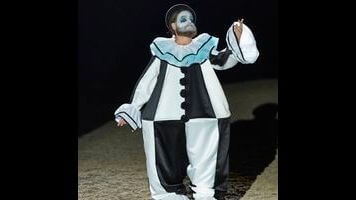Zach Galifianakis sneaks beauty into the cringe-comedy Baskets

Before the word “comedy” was defined as it is today, it meant “poem.” That’s perhaps the best lens through which to view Baskets, the new dark comedy from creators Louis CK, Zach Galifianakis, and Jonathan Krisel (Portlandia), who also directs the first five episodes. That’s not to say it isn’t funny—it is, in the way that Between Two Ferns balances funny and awful in equal parts—but that it’s often more interested in pathos. Not surprising, given that the show’s home, FX, also plays host to the melancholic Louie, but what sets Baskets apart from CK’s other series is the way it adheres to reality. Louie, for the most part, exists in our world. Baskets exists in the eponymous rodeo clown’s world, and it’s an ugly place to be.
That world, at first, is in France. Galifianakis plays Chip Baskets, a man determined to follow his dream of being a clown in the most highbrow sense of the word. He heads off to a highfalutin clowning academy in Paris, despite his financial woes and the fact that he doesn’t speak a lick of the language. It’s a gap that no amount of smoking and vest-wearing can bridge, and soon he’s back in Bakersfield, California with his new wife Penelope (Sabina Sciubba of Brazilian Girls)—who’s made it very clear that she does not love him and only wants a green card—in tow. Six months later, he’s living in a motel, making scraps working as a rodeo clown, avoiding his family (which includes his mother, played by Louie Anderson in drag, and his twin brother Dale, also played by Galifianakis) and trying desperately to get the world to take him as seriously as he takes himself.
It’s that struggle that defines both the story and the humor of the first few episodes, leaving room for little else. There’s no way around it: Baskets is a depressing watch, and for artists, it may be even harder to stomach. The role of the self-important but utterly insecure struggling artist is a perfect fit for Galifianakis’ sad-eyed, hostile demeanor, and the effect is reminiscent of the best of Buster Keaton, with Chip making pratfall after pratfall, tossed by bulls and toppling off of rollerblades while surrounded by an unshakeable cloud of gloom. Sprinkled between every cringe and outburst are moments of startling beauty, but in nearly all cases, they’re crushed—by the world, by another person, by Chip himself. “You’re just a grumpy little guy, aren’t you?” one character asks. Baskets doesn’t even bother to respond.
It doesn’t always work—early on, the show struggles to define exactly how in on the joke it is, leading to heavy-handed bits like the interminable soda joke used in many of the previews, which distract from the world that Baskets is so carefully building. But when that balance is found, it soars, precisely because the writers take Baskets very seriously—but they don’t take themselves seriously at all. It’s heavy, to be sure—Galifianakis quoted Krisel as calling it a “slapstick drama” in an interview with the Wall Street Journal—but created with a light touch. They don’t spell too much out, particularly once the show gets going, and trust that the audience, like the show, will settle in eventually.
Boy, does it ever. The performances, both of Galifianakis and his supporting cast, begin to crystallize in the third episode, “Strays.” The moments of brilliance seen in the early episodes become far more frequent, and as Chip crumbles, Galifianakis gets better and better. Even Dale, who at first seems to have wandered in from Tim And Eric Awesome Show, Great Job! unawares, gets some more thoughtful shading. And both Anderson and Martha Kelly (as insurance agent and default friend Martha) turn in unstudied, compassionate performances while serving as highly capable straight men to Chip’s angry buffoon. Anderson, in particular, is excellent. While the casting of Christine Baskets is jarring at first, eventually Anderson’s gender fades into the background, and his performance becomes less Divine and more divine.
By the time episodes four and five roll around—both written by playwright and MacArthur genius grantee Samuel D. Hunter—Baskets hits its stride in earnest, gracefully balancing absurdity and despair, hostility and humanity, pratfalls and pathos. It exists in a place where laughs get stuck in a muttered “there but for the grace of God go I.” Like one of the show’s memorable images, it’s a rollerblader coasting down a busy street, sure of where it’s going but not above a few stumbles along the way. As with all things bitter, it’s an acquired taste, but worth the time it takes to get there.